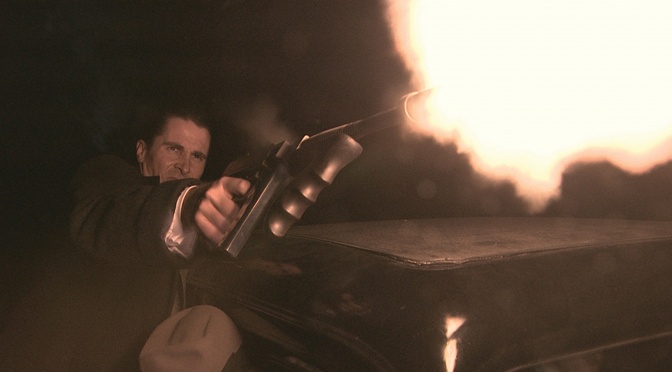
Neither especially well-crafted nor completely inept, Death of a Snowman is less interesting as a film than as an artifact. You might hope that a low-budget crime drama shot in and around Johannesburg, South Africa, during the apartheid years would deal explicitly with political conditions in the segregated country. Instead — perhaps because of government censorship or fears of political reprisals — Death of a Snowman has only the whiff of racial tension about it, as whites and blacks doubt, disbelieve and double-cross one another from start to finish.
Tag Archives: crime
Winter’s Bone
The Bad Lieutenant: Port of Call: New Orleans
Lorna’s Silence

Lorna is in Belgium on false pretenses. She married a man, a junkie, in order to gain citizenship (and a cash reward). The men who arranged her relocation to Belgium from Albania have a plan for her. Once she is widowed — and the men will see to it that she becomes a widow — she is to marry a Russian, who will use her legal status as a Belgian to gain his own citizenship. When she begins to care for her husband, who is trying hard to dig out of the hole he’s in, with some success, she starts trying to gain him a reprieve from the awful fate that he’s too far into his haze to anticipate. The film is truly Lorna’s story. Not once is the film’s audience given information Lorna is not privy to, or shown a scene that she doesn’t witness. This intense subjectivity, and Lorna’s eventually breakdown in the face of her experience, ultimately yields an unsettling examination of the morals of desperation and the sometimes desperate nature of morality.
Nikkatsu Noir: Eclipse (Criterion) Series 17

The latest addition to Criterion’s budget-priced and barebones Eclipse line-up is this boxed set of five films from a cycle of tough-minded crime dramas that enjoyed popularity in post-WWII Japan. Little-seen in the U.S., this group of films as a whole probably benefits from Japanese settings and attitudes that bring a sense of freshness, even exoticism, to straightforward genre exercises. But the films are entertaining and engrossing on their own terms, and, more than that, they paint an interesting picture of a culture in a generational transition and, perhaps, a bit of an identity crisis — they’re clearly derivative of American film noir and French crime films of the period. And the best ones in the set — for my money, Seijun Suzuki’s Take Aim at the Police Van and Takashi Nomura’s A Colt Is My Passport (pictured at top) — hold their own against any crime film of the period. Together, they provide a sketch, in necessarily broad strokes, of a key period in the development of the popular Japanese cinema. Nikkatsu Noir![]()
is a terrific collection.
Public Enemies

Simultaneously a tough guy and a sap, a realist and a romantic, director Michael Mann has for decades now been making movies about what it means to be a man. He chooses to tell these stories in familiar settings, setting his fairly measured character studies in the kind of testosterone-soaked milieu that has been favored by a century of manly filmmakers. Mann has made movies about cops and robbers. There’s one about a cab driver and an assassin, one about a whistleblower and another about a great athlete. He’s even made a supernatural horror movie set among Nazis. But he keeps returning to the subject of heroes and villains, about the role-playing that takes place when good guys go head-to-head with bad guys, and about what happens when the line between antagonist and protagonist gets blurred.
Surveillance

Either it runs in the family or Jennifer is one hell of a mimic, because there’s an unmistakably Lynchian undercurrent to much of the goings-on in Surveillance, which lends some juice to a somewhat pulpy yet dry and familiar scenario. During the opening scenes, as Bill Pullman and Julia Ormond show up at a tiny police precinct wearing the kind of blue suits that denote FBI badgeholders, the younger Lynch adds an otherwordly soundtrack drone to the activity that flashed me right back to the first reel or so of Twin Peaks: Fire Walk With Me.
Observe and Report
 New York Times critic Bosley Crowther once complained of Stanley Kubrick’s harrowing and hilarious Cold War satire Dr. Strangelove, or: How I Learned to Stop Worrying and Love the Bomb, “Virtually everybody turns up stupid or insane — or, what is worse, psychopathic.” Crowther’s concern was not just that Kubrick was making a sick joke out of the idea of nuclear war, but that he seemed (to Crowther) to be out to undermine, discredit and mock the entire American military and executive establishment, depicting the U.S.A. itself as a dangerously deranged member of the global community. Dr. Strangelove is, of course, essential satire and a stone classic. Observe and Report is more derivative and less urgent. Still, it’s quite something. Watching it made me feel a little bit like Bosley Crowther fussing over the Kubrick. “Somehow, to me, it isn’t funny,” Crowther wrote. “It is malefic and sick.”
New York Times critic Bosley Crowther once complained of Stanley Kubrick’s harrowing and hilarious Cold War satire Dr. Strangelove, or: How I Learned to Stop Worrying and Love the Bomb, “Virtually everybody turns up stupid or insane — or, what is worse, psychopathic.” Crowther’s concern was not just that Kubrick was making a sick joke out of the idea of nuclear war, but that he seemed (to Crowther) to be out to undermine, discredit and mock the entire American military and executive establishment, depicting the U.S.A. itself as a dangerously deranged member of the global community. Dr. Strangelove is, of course, essential satire and a stone classic. Observe and Report is more derivative and less urgent. Still, it’s quite something. Watching it made me feel a little bit like Bosley Crowther fussing over the Kubrick. “Somehow, to me, it isn’t funny,” Crowther wrote. “It is malefic and sick.”


